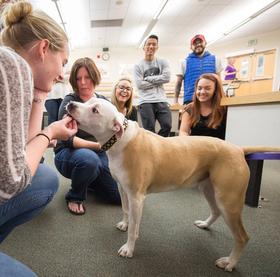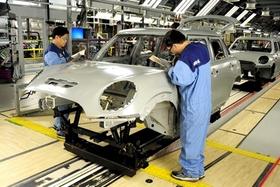Despite the high unemployment rate and sluggish economy plaguing much of the country, there are numerous industries that can’t find enough skilled workers to staff their offices. To address both of these issues, community colleges nationwide are developing training programs in fields facing staffing shortages, putting displaced workers back on the job, and filling company needs. One focus to this end is on the manufacturing industry, a field that promises long-term economic growth and job stability. Community colleges are answering the manufacturing call, with new programs cropping up at campuses coast to coast.
Manufacturing Program Expanding at Asnuntuck
Already boasting a successful manufacturing training program, Asnuntuck Community College is preparing to expand to allow even more students the opportunity to move into this lucrative field. According to the Windsor Locks Patch, the Connecticut state legislature recently passed a comprehensive jobs bill that allotted $2.2 million to the school for the purpose of growing its precision manufacturing program. The hope is that the expansion of the program will encourage long-term economic growth in the area by boosting small business opportunities.
“Small business continues to be the engine that drives our economy,” State Representative Kathleen Tallarita (D-Enfield) told the Patch. “Investing in the future of Connecticut’s small businesses is essential to our continued economic growth.”
The funding will increase the manufacturing program's student body from 200 to 350 full-time students. It will also increase the number of incumbent workers from 325 to 450. The money will allow the school to replace old equipment and expand its resources. The funding will be gradually distributed over a two-year period, according to a report in the Hartford Courant.
Asnuntuck was chosen to receive the funding in part because the manufacturing program they have in place is already highly successful. The director of Asnuntuck’s Manufacturing Technology Center, Frank Gulluni, told the Courant that all of the graduates within the program find jobs, whether they are brand new to the workforce or displaced workers looking to make a career switch.
“Asnuntuck’s program has been very successful because of the very close relationship they’ve developed with manufacturers in north central Connecticut and the Enfield area,” Mary Anne Cox, assistant chancellor of the Connecticut Community College system, told the Courant.
This video gives an overview of the manufacturing training program at Northwest State Community College.
Additional Connecticut Schools to Benefit from Funding
The Connecticut state legislature did not stop at funding for Asnuntuck. An additional $17.8 million from the jobs bill, which totaled $626 million, will also be used to clone the Asnuntuck manufacturing program at other schools in the state. Three schools will be selected to implement new manufacturing training programs, although the specific colleges have yet to be selected.
“[Asnuntuck] has been very responsive to the needs of businesses in that area,” Cox explained to the Courant. “We’re very much looking forward to an initiative that will continue the role of Connecticut community colleges in building the state’s economy by building its workforce.”
Right Skills Now to Begin Pilot Program in Minneapolis Area
Community colleges in Minnesota will soon reap the benefits of a tighter relationship between educators and business owners to raise up skilled workers to fill much-needed positions. Right Skills Now is a partnership between the President’s Job Council, The Manufacturing Institute, the National Institute for Metalworking Skills, and ACT – a non-profit organization committed to helping people achieve education and workplace success.
“Skill gaps carry serious consequences for our nation’s competitiveness in global markets,” Martin Scaglione, president of ACT Workforce Development Divison, stated in a press release at Reuters. “Upskilling our workforce is an urgent priority.”
According to the press release, the primary aim of Right Skills Now is to get highly skilled, work-ready graduates to employers who need them. To that end, participating community colleges must align their curricula to the proper credentials for employment. The program will begin with training in heavy machining since that is an employment gap currently faced by employers in the area. However, if the program is successful, it could expand to other areas of manufacturing as well.
Colleges participating in the Right Skills Now pilot program include Dunwoody College of Technology in Minneapolis and South Central Community College campuses in Faribault and North Mankato.
“Blending academic learning and classroom credit with employer-driven workplace competencies represents an important step in reforming the workforce development system,” Scaglione explained. “Right Skills Now exemplifies those concepts by linking job-specific college courses with essential foundational skills.”
This video reports on the advanced manufacturing training program at Shoreline Community College.
Certification for Production Technicians Coming to Chattahoochee Community College
In Georgia, students interested in becoming certified production technicians will find the right fit at Chattahoochee Community College. This school is the only certified Manufacturing Skills Standards Council Center in Georgia, according to a report at the Marietta Daily Journal. The new certification program will expand the school’s current offering of manufacturing training programs.
“Trained and certified production technician workers can help this community to be more competitive in attracting high-wage/high-skilled jobs,” Glenn Rasco, vice president of Community and Economic Development for Chattahoochee, told the Journal. “This program will help address the growing skills gap by making it clear to workers what skills they need to work in manufacturing, and at the same time enable manufacturers to identify applicants who have the requisite skills.”
Manufacturing is still a large part of the economy and workforce in the United States, but skilled workers have become harder to find. New community college programs will close the skills gap and boost economic growth throughout the country.
Questions? Contact us on Facebook. @communitycollegereview















